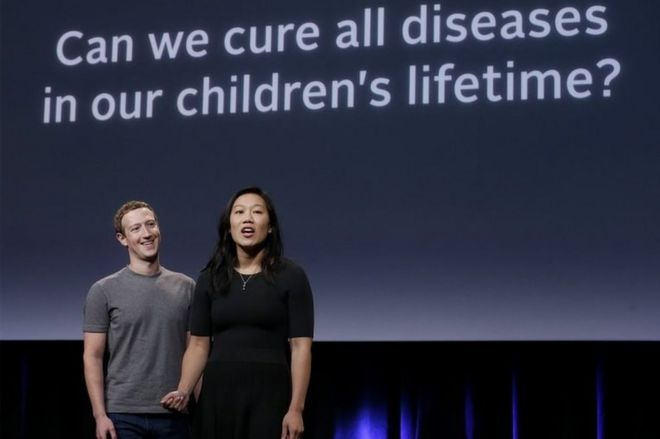
Facebook's founder Mark Zuckerberg
and his wife Priscilla Chan have pledged $3bn (£2.3bn) to fund medical
research over the next decade.
At a press conference in San
Francisco, they said their ultimate goal was to "cure, prevent or manage
all diseases by the end of the century".The funds will be distributed by the Chan Zuckerberg Initiative, which they created in December 2015.
Tech leaders are increasingly turning their attention to health.
Earlier in the week, Microsoft said it intended to "solve" cancer by using artificial intelligence tools.
Google's DeepMind unit is working with the NHS to find a way to use computers to more accurately diagnose diseases.
And IBM and MIT announced a tie-up earlier this week to develop AI-based systems that could help clinicians improve the care of elderly and disabled patients.
Even so, the Chan Zuckerberg plan is marked by its ambition.

He outlined three principles that will guide the couple's investments:
- to bring scientists and engineers together
- to build tools and technology that advance research
- to grow the movement to fund more science around the world
The Biohub will initially work on two projects.
The first is the Cell Atlas, a "map" that describes the different types of cells that control the body's major organs.
The second is the Infectious Disease Initiative, which will try to develop new tests and vaccines to tackle HIV, Ebola, Zika and other new diseases.
Mr Zuckerberg predicted that by 2100 the average life expectancy would be beyond 100 years.
But he cautioned that it would take years before the couple's fund led to the creation of new medical treatments and further time before they could be applied to patients.
They had previously announced investments in education-related start-ups.
One expert said that dealing with all disease was "clearly ambitious" but added that deep-pocketed philanthropists were defined by the fact they could take such risks.
"The Chan Zuckerberg announcement is unusual in size but is in keeping with trends amongst today's biggest donors who want to achieve transformational change, prefer funding prevention over cure and tend to invest in causes and organisations with which they have prior connections," commented Dr Beth Breeze, director of the centre for philanthropy at the University of Kent.
"Most donations reflect the 'philanthropic autobiography' of the donor and this is no exception.
"Chan is an alumna of the University of California, San Francisco.
"So, the couple will already know and trust the people who will spend the money.
"She is trained as a paediatrician and recently became a mother so is aligning her professional and personal experiences with her philanthropic priorities."
Sign up here with your email
ConversionConversion EmoticonEmoticon